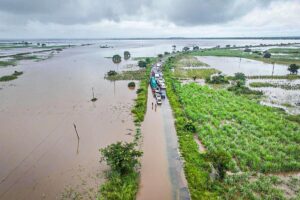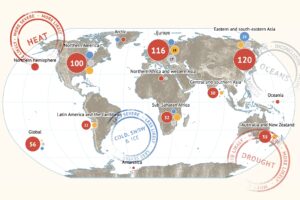Welcome to Carbon Brief’s DeBriefed.
An essential guide to the week’s key developments relating to climate change.
This week
Coral mass bleaching
FOURTH MASS BLEACHING: US government scientists confirmed that the world is facing its fourth mass coral bleaching event, which is on track to be the “most extensive on record”, the Guardian reported. Mass coral bleaching is a phenomenon of the climate change era, first occurring in 1998, the story said. It added that 54% of ocean waters with coral reefs have experienced heat stress high enough for bleaching.
BARRIER BREACHED: The Great Barrier Reef – the world’s largest coral reef – has been through its most acute and widespread heat stress event ever, Coral Reef Watch confirmed to the Guardian. Coral reef scientist Prof Terry Hughes told the New York Times that the “levels of heat stress measured in Florida, across the entire Caribbean, and now on the Great Barrier Reef are off the charts”.
THE BIG DRY: Meanwhile, scientists in the Conversation explained the causes of a mass vegetation “die-off” in Western Australia’s forests and shrublands in February 2024, as the region “sweltered” through its hottest summer on record. “Just like a coral bleaching event, plants are responding to the cumulative stress of the unusually long, hot and dry summer,” the authors wrote.
World Bank spring meetings
BETTER HAVE BILLIONS: All eyes were on the World Bank and International Monetary Fund (IMF) spring meetings in Washington DC this week. As civil society and economists said wealthy nations must pledge billions more in aid through the bank to tackle climate change, president Ajay Banga told journalists at the meeting “the climate crisis would be a priority” for the bank going forward, the Guardian reported. Experts quoted by the newspaper, however, questioned the bank’s willingness to reform “in a race against time”.
DEBT TRAP: While the “long-simmering theme” of who should pay for climate damages raised its head again, debt was at front and centre at the meetings, the Financial Times reported. A report quoted in a Climate Home News comment by Asian debt activist Lidy Nacpil warned that 47 developing countries could go bankrupt from climate spending, but cancelling fossil fuel debts could free up the money needed.
LUXURY LOANS: Elsewhere, a Climate Home News investigation found that the World Bank counted support for five-star luxury hotels in Senegal as climate finance. Fishermen told the publication that the hotels had “exacerbated erosion” in their area.
Dubai floods
DUBAI FLOODS: The UAE was hit by an intense storm, with almost a year and a half’s worth of rain pummeling the capital of Dubai on Tuesday, the Independent reported. The country experienced its heaviest rains in 75 years, said national meteorological authorities quoted in the Financial Times. The newspaper added that more than a dozen people were killed in neighbouring Oman. The rains were likely exacerbated by climate change, reported Reuters.
SEEDING DOUBT: While a Bloomberg article citing one person initially blamed “cloud-seeding” for the extreme rainfall, multiple meteorologists quoted in different outlets including the Guardian and the Associated Press debunked such claims. “You can’t create rain out of thin air per se and get six inches of water,” meteorologist Ryan Maue told AP.
DEJA VU DISASTER: Flash floods, lightning and heavy rain also claimed 63 lives in Pakistan, with the northwestern province of Khyber Pakhtunkhwa recording the most fatalities, the Associated Press reported. In Baluchistan, authorities declared a state of emergency, with more rains expected amid rescue and relief operations.
Around the world
- INDIA VOTES: The first phase of voting in India’s general elections began today, as millions queued in scorching summer temperatures. Carbon Brief mapped where key national parties stood on climate change in their election manifestos.
- DEFORESTATION DROPS: Deforestation on Indigenous lands across the Amazon has declined by 42% since last year and dropped to a six-year record low, according to a report by Brazilian research institute Imazon cited by O Globo.
- ECUADOR ENERGY EMERGENCY: On Tuesday, Ecuadorian president Daniel Noboa declared an “energy emergency”, after an El Niño-driven drought hit hydropower production and led to country-wide power cuts, Reuters reported.
- MORE FOOTWORK, MORE ENERGY: Scientist and Mexico’s election frontrunner Claudia Sheinbaum unveiled a $13.6bn investment plan for solar, wind, hydro and gas projects, Reuters reported, calling it a “significant shift” from the current president’s oil-first priorities.
- SCOTLAND SETBACK: The first country in the world to declare a “climate emergency” is “ditching” its ambitious target of reducing emissions by 75% by 2030, BBC News reported, after failing to meet eight of its 12 last annual targets.
- SBTi CONTROVERSY: The Science Based Targets initiative, the leading arbiter of corporate climate targets, said there was “no change” to its standards, after an earlier suggestion that companies might be able to use carbon offsets to meet their goals led to a staff revolt, the Financial Times reported.
$38 trillion
The annual cost of rising temperatures, heavier rainfall and more frequent and intense extreme weather by 2049, under a medium emissions scenario, according to a new study by Germany’s Potsdam Institute for Climate Impact Research.
Latest climate research
- The Atlantic hurricane season could increase by well over a month (between 27 to 41 days) in the future because of the combined impact of climate change and natural climate variability, according to new research in Geophysical Research Letters.
- Marine animals seeking cooler temperatures as oceans warm could end up in areas where they will be exposed to deadly cold snaps, new research found. Carbon Brief had all the details.
- A new World Weather Attribution study found that El Niño was a “key driver” of a current severe drought in southern African countries, while climate change did not play as significant a role. A second WWA study found that an extreme heatwave striking the Sahel region between the end of March and the beginning of April would have been impossible without climate change.
(For more, see Carbon Brief’s in-depth daily summaries of the top climate news stories on Monday, Tuesday, Wednesday, Thursday and Friday.)
Captured

New documents obtained by Carbon Brief as part of a freedom-of-information (FOI) request revealed that the UK government reclassified nearly £500m in humanitarian aid meant for war-torn nations as climate finance, in a bid to help meet its pledges under the Paris Agreement. According to Carbon Brief analysis, the humanitarian projects in nations such as Afghanistan, Yemen and Somalia being “double-counted” as climate finance have no explicit link to climate action. While the UK was previously viewed as setting higher standards than other countries on climate finance, experts told Carbon Brief that the government’s new approach of repackaging development and humanitarian aid instead of providing new money “risks breeding cynicism and mistrust”.
Spotlight
Elections in India’s coal and elephant country
On the eve of India’s general elections, Carbon Brief travels to the central Indian state of Chhattisgarh to speak to Indigenous communities protesting against coal mining in their sacred Hasdeo Arand forest.

On the winding hill road to the Hasdeo Arand forest, I was told by Indigenous activists to not get my hopes up for what I would – and would not – get to see. “Things are tense,” said an anxious Ramlal Kariyam on the phone to me. A thatched forest camp on the edge of the Parsa East Kete Basan (PEKB) coal mine was burned to the ground at 2am on 25 March, days before my visit. Police are still investigating the incident.
The camp was the epicentre of two-year-long relay protests to save one of India’s last contiguous tracts of dense sal forest from being clear-felled for coal. I had hoped to see the PEKB mine’s expansion and signs of rapid deforestation, but did not want to put villagers at risk. What I did not count on seeing through the sal trees on the side of the road was an elephant.
For years, India’s forest and state authorities ignored and concealed the presence of an elephant corridor in Hasdeo Arand, as they approved further fragmentation of what was once a “no-go” forest for coal mining. Even a spanner-like verdict in 2014 from India’s top environmental court acknowledging elephant presence and cancelling forest permits could not pause the excavators: its judgement remains stayed by India’s supreme court.
Mining in Hasdeo Arand began with the Bharatiya Janata Party (BJP) in power at the state level and the Congress party at the centre. But it gained pace after Modi assumed power at the national level in 2014. In 2018, voters in these districts gave Congress its most comprehensive victory in Chhattisgarh, after giving assurances that it would put Indigenous rights first. Instead, Congress greenlit the clearing of even more tracts of forest for coal and was voted out last December.
“There’s no relief for us in coal areas…In 2014, we passed resolutions in all our villages saying that there is very dense forest here that should never be bartered for coal, but the government has continued auctioning our lands based on falsified consent,” alleged Umeshwar Singh Armo, the 43-year-old chief of the village of Paturia, speaking to Carbon Brief in the spartan mud office of the Save Hasdeo Movement (pictured above). “We’ve tried every democratic, peaceful means to talk to the government, but nothing has happened.”
While mining was slow to first begin, its reserves have been exhausted faster than expected. “Brother, how much coal do you want? They’re mining with such speed that they can finish a place’s wealth in five years,” said Ramlal. “When I’m sitting alone, I often think to myself: Will we be able to save this place? When we’re displaced, what will happen to all the other creatures here? The state is extinguishing so many lives and species for just one man.”
The only thing that has been able to significantly stop more coal blocks from going under the hammer? Elephants.
In 2021, the state cabinet agreed to establish the stalled Lemru elephant reserve. In 2022, Chhattisgarh’s then-chief minister from the Congress party told the Modi government’s coal ministry that two coal blocks – including Gidhmuri-Paturia where Singh lives – should not be mined because they fall within the elephant reserve’s boundaries.
“Both [Congress and BJP] governments [state and national] work for the benefit of mining companies, but at least the Congress listens to democratic movements like ours that oppose mining,” said Singh. “The BJP, it doesn’t have that. If forests are finished, villages are finished, other species are finished, it makes no difference to them. The many laws that exist are all broken and made subservient to coal, they can magically turn dense forests into scrub forests when it suits them.”
As of last week, the movement has rebuilt its protest camp and is considering supporting Indigenous-led parties. Singh is defiant. He concluded:
“For the longest time, it’s just these two parties that called the shots, and yet both parties lost when they failed to keep our movements in mind. If you want to take our forest land from us, the very least you can do is to talk to us about it.”
Watch, read, listen
SWISS PRECEDENT: A podcast by the Guardian spoke to 76-year-old Elisabeth Stern, part of a 2,400-strong group of senior Swiss women who won a landmark climate case last week in the European court for human rights.
LOST SHEIN: A new longread in n+1 reviewed the strange, online universe of fast fashion’s “worst offender” Shein and the material costs of throwaway textile retail.
EV MYTHS BUSTED: Carbon Brief’s Dr Simon Evans busted electric vehicle myths on the Canadian podcast Buzzkill.
Coming up
- 15-20 April: World Bank and International Monetary Fund Spring Meetings, Washington DC
- 19 April: First phase of voting in India’s general election begins
- 23 April: IEA’s Global EV Outlook 2024 report launch, Paris
- 23-29 April: Fourth session of intergovernmental negotiations to develop a binding plastics treaty, Ottawa, Canada
Pick of the jobs
- Nature Communications, associate or senior editor (physical oceanography and climate sciences) | Salary: $74,000 or $91,000. Location: Shanghai, Beijing, Nanjing, New York, Washington, Jersey City or Pune (hybrid)
- Mongabay, staff writer – west and central Africa | Salary: Unknown. Location: Must be based in any part of west or central Africa
- Loss and Damage Research Observatory, scholars for the Saleemul Huq Memorial Scholarship | Scholarship amount: $5,000, with an additional $1,000 towards travel and research expenses. Location: Hybrid, researchers and local organisations from Least Developed Countries (LDCs) and Small Island Developing States (SIDS)
DeBriefed is edited by Daisy Dunne. Please send any tips or feedback to debriefed@carbonbrief.org.
This is an online version of Carbon Brief’s weekly DeBriefed email newsletter. Subscribe for free here.
The post DeBriefed 19 April 2024: ‘Most extensive’ global coral bleaching; World Bank spring meetings; India’s election kicks off appeared first on Carbon Brief.
Greenhouse Gases
DeBriefed 27 February 2026: Trump’s fossil-fuel talk | Modi-Lula rare-earth pact | Is there a UK ‘greenlash’?
Welcome to Carbon Brief’s DeBriefed.
An essential guide to the week’s key developments relating to climate change.
This week
Absolute State of the Union
‘DRILL, BABY’: US president Donald Trump “doubled down on his ‘drill, baby, drill’ agenda” in his State of the Union (SOTU) address, said the Los Angeles Times. He “tout[ed] his support of the fossil-fuel industry and renew[ed] his focus on electricity affordability”, reported the Financial Times. Trump also attacked the “green new scam”, noted Carbon Brief’s SOTU tracker.
COAL REPRIEVE: Earlier in the week, the Trump administration had watered down limits on mercury pollution from coal-fired power plants, reported the Financial Times. It remains “unclear” if this will be enough to prevent the decline of coal power, said Bloomberg, in the face of lower-cost gas and renewables. Reuters noted that US coal plants are “ageing”.
OIL STAY: The US Supreme Court agreed to hear arguments brought by the oil industry in a “major lawsuit”, reported the New York Times. The newspaper said the firms are attempting to head off dozens of other lawsuits at state level, relating to their role in global warming.
SHIP-SHILLING: The Trump administration is working to “kill” a global carbon levy on shipping “permanently”, reported Politico, after succeeding in delaying the measure late last year. The Guardian said US “bullying” could be “paying off”, after Panama signalled it was reversing its support for the levy in a proposal submitted to the UN shipping body.
Around the world
- RARE EARTHS: The governments of Brazil and India signed a deal on rare earths, said the Times of India, as well as agreeing to collaborate on renewable energy.
- HEAT ROLLBACK: German homes will be allowed to continue installing gas and oil heating, under watered-down government plans covered by Clean Energy Wire.
- BRAZIL FLOODS: At least 53 people died in floods in the state of Minas Gerais, after some areas saw 170mm of rain in a few hours, reported CNN Brasil.
- ITALY’S ATTACK: Italy is calling for the EU to “suspend” its emissions trading system (ETS) ahead of a review later this year, said Politico.
- COOKSTOVE CREDITS: The first-ever carbon credits under the Paris Agreement have been issued to a cookstove project in Myanmar, said Climate Home News.
- SAUDI SOLAR: Turkey has signed a “major” solar deal that will see Saudi firm ACWA building 2 gigawatts in the country, according to Agence France-Presse.
$467 billion
The profits made by five major oil firms since prices spiked following Russia’s invasion of Ukraine four years ago, according to a report by Global Witness covered by BusinessGreen.
Latest climate research
- Claims about the “fingerprint” of human-caused climate change, made in a recent US Department of Energy report, are “factually incorrect” | AGU Advances
- Large lakes in the Congo Basin are releasing carbon dioxide into the atmosphere from “immense ancient stores” | Nature Geoscience
- Shared Socioeconomic Pathways – scenarios used regularly in climate modelling – underrepresent “narratives explicitly centring on democratic principles such as participation, accountability and justice” | npj Climate Action
(For more, see Carbon Brief’s in-depth daily summaries of the top climate news stories on Monday, Tuesday, Wednesday, Thursday and Friday.)
Captured
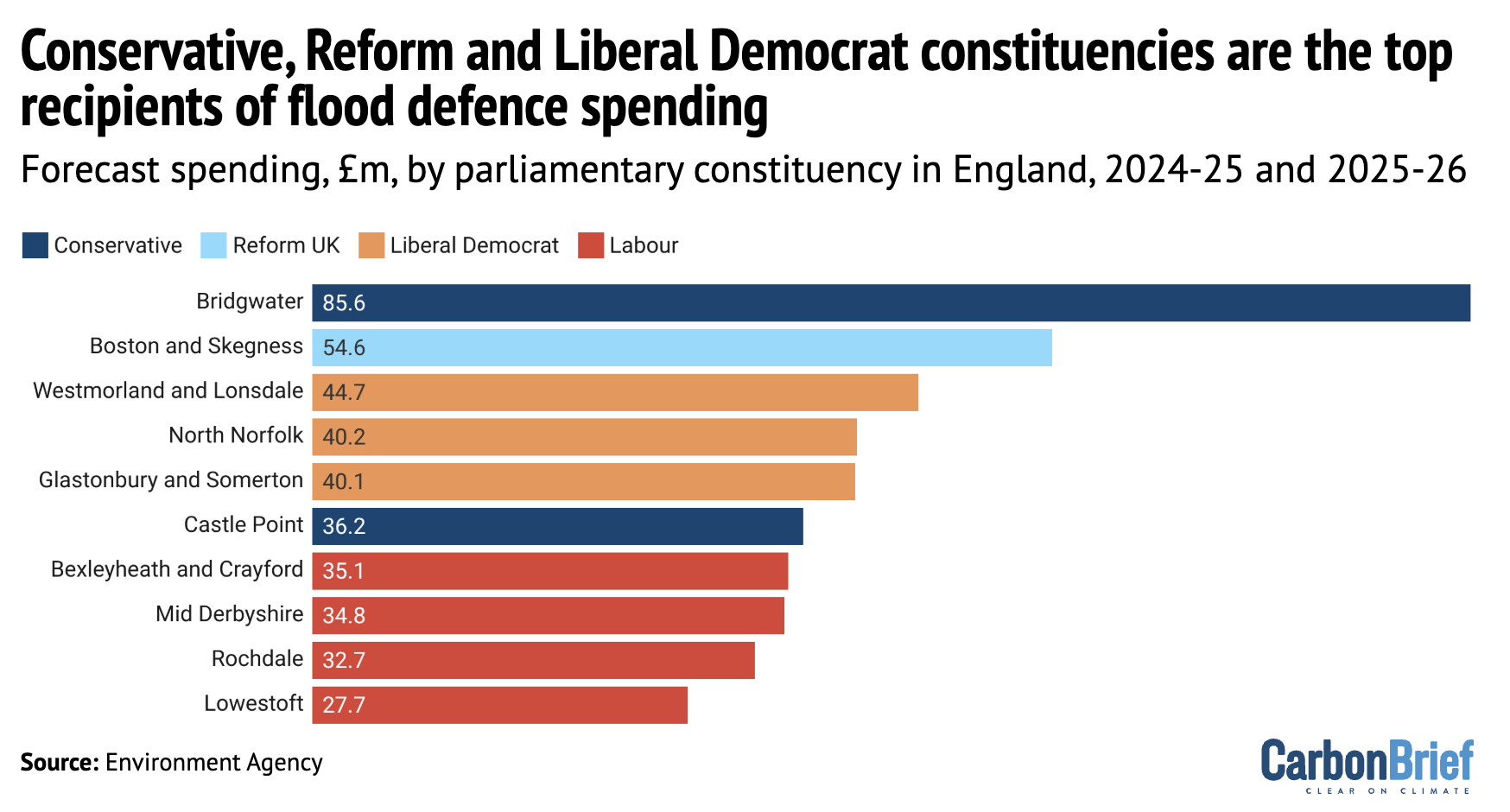
The constituency of Richard Tice MP, the climate-sceptic deputy leader of Reform UK, is the second-largest recipient of flood defence spending in England, according to new Carbon Brief analysis. Overall, the funding is disproportionately targeted at coastal and urban areas, many of which have Conservative or Liberal Democrat MPs.
Spotlight
Is there really a UK ‘greenlash’?
This week, after a historic Green Party byelection win, Carbon Brief looks at whether there really is a “greenlash” against climate policy in the UK.
Over the past year, the UK’s political consensus on climate change has been shattered.
Yet despite a sharp turn against climate action among right-wing politicians and right-leaning media outlets, UK public support for climate action remains strong.
Prof Federica Genovese, who studies climate politics at the University of Oxford, told Carbon Brief:
“The current ‘war’ on green policy is mostly driven by media and political elites, not by the public.”
Indeed, there is still a greater than two-to-one majority among the UK public in favour of the country’s legally binding target to reach net-zero emissions by 2050, as shown below.
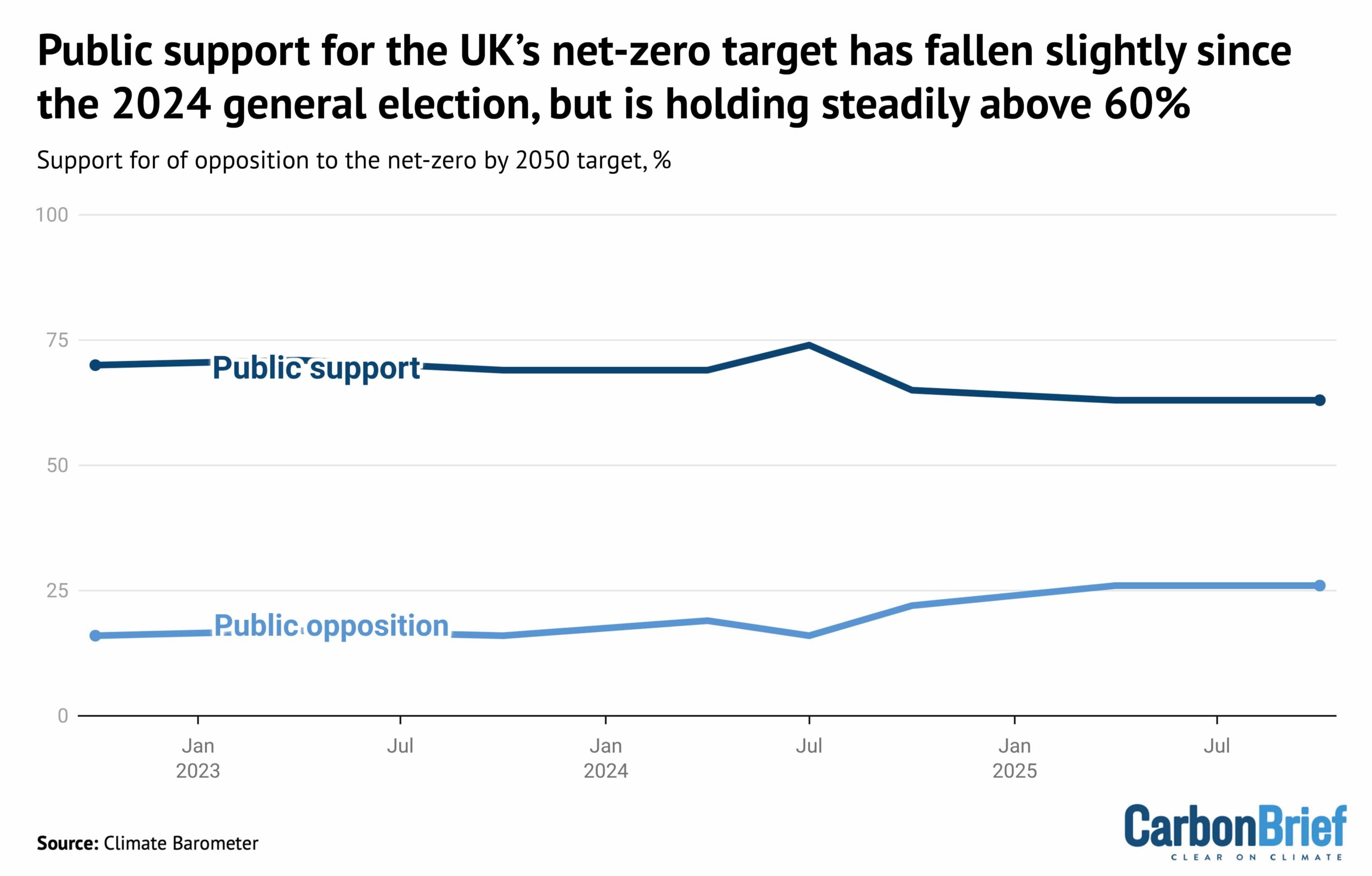
Steve Akehurst, director of public-opinion research initiative Persuasion UK, also noted the growing divide between the public and “elites”. He told Carbon Brief:
“The biggest movement is, without doubt, in media and elite opinion. There is a bit more polarisation and opposition [to climate action] among voters, but it’s typically no more than 20-25% and mostly confined within core Reform voters.”
Conservative gear shift
For decades, the UK had enjoyed strong, cross-party political support for climate action.
Lord Deben, the Conservative peer and former chair of the Climate Change Committee, told Carbon Brief that the UK’s landmark 2008 Climate Change Act had been born of this cross-party consensus, saying “all parties supported it”.
Since their landslide loss at the 2024 election, however, the Conservatives have turned against the UK’s target of net-zero emissions by 2050, which they legislated for in 2019.
Curiously, while opposition to net-zero has surged among Conservative MPs, there is majority support for the target among those that plan to vote for the party, as shown below.
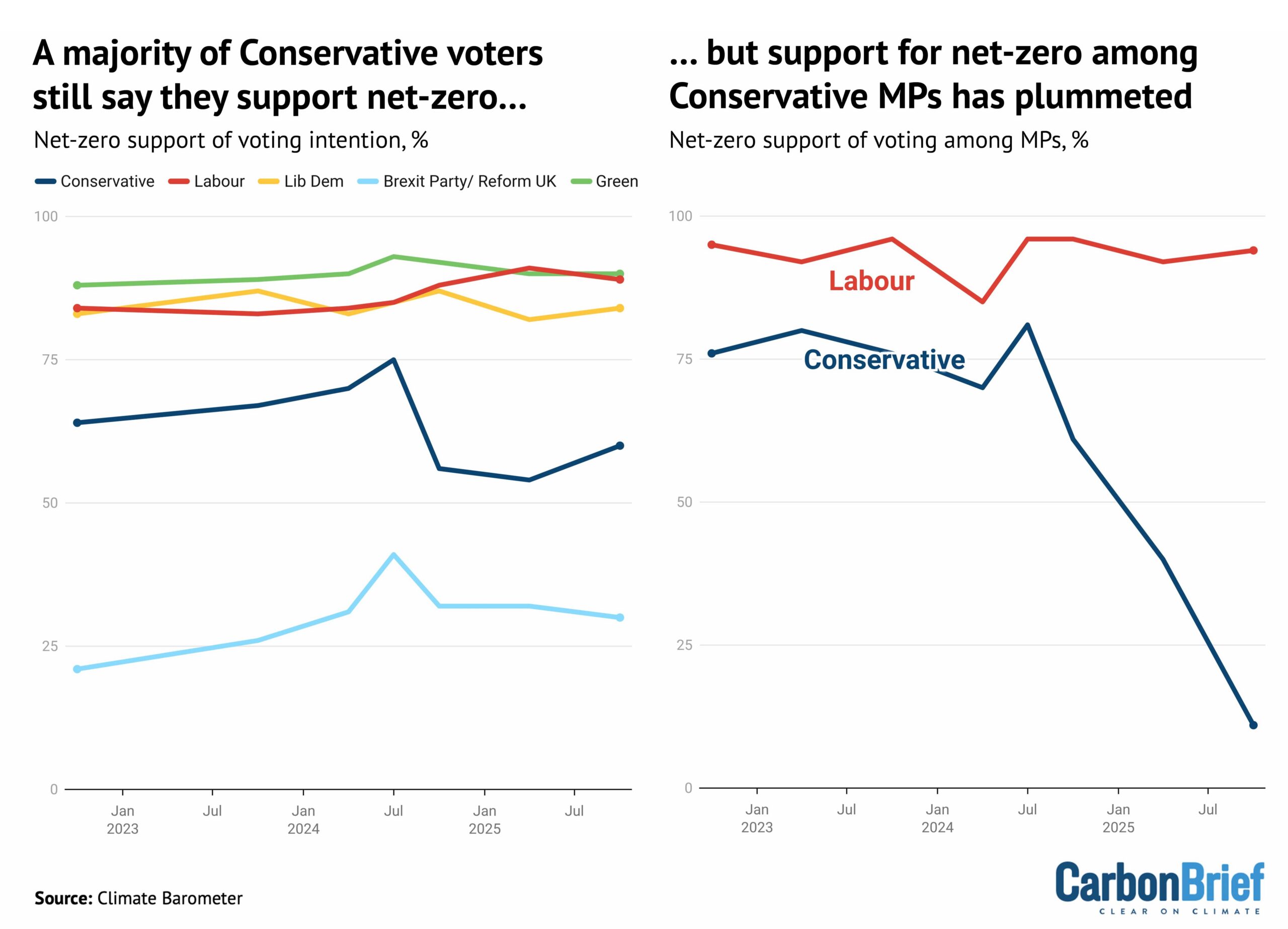
Dr Adam Corner, advisor to the Climate Barometer initiative that tracks public opinion on climate change, told Carbon Brief that those who currently plan to vote Reform are the only segment who “tend to be more opposed to net-zero goals”. He said:
“Despite the rise in hostile media coverage and the collapse of the political consensus, we find that public support for the net-zero by 2050 target is plateauing – not plummeting.”
Reform, which rejects the scientific evidence on global warming and campaigns against net-zero, has been leading the polls for a year. (However, it was comfortably beaten by the Greens in yesterday’s Gorton and Denton byelection.)
Corner acknowledged that “some of the anti-net zero noise…[is] showing up in our data”, adding:
“We see rising concerns about the near-term costs of policies and an uptick in people [falsely] attributing high energy bills to climate initiatives.”
But Akehurst said that, rather than a big fall in public support, there had been a drop in the “salience” of climate action:
“So many other issues [are] competing for their attention.”
UK newspapers published more editorials opposing climate action than supporting it for the first time on record in 2025, according to Carbon Brief analysis.
Global ‘greenlash’?
All of this sits against a challenging global backdrop, in which US president Donald Trump has been repeating climate-sceptic talking points and rolling back related policy.
At the same time, prominent figures have been calling for a change in climate strategy, sold variously as a “reset”, a “pivot”, as “realism”, or as “pragmatism”.
Genovese said that “far-right leaders have succeeded in the past 10 years in capturing net-zero as a poster child of things they are ‘fighting against’”.
She added that “much of this is fodder for conservative media and this whole ecosystem is essentially driving what we call the ‘greenlash’”.
Corner said the “disconnect” between elite views and the wider public “can create problems” – for example, “MPs consistently underestimate support for renewables”. He added:
“There is clearly a risk that the public starts to disengage too, if not enough positive voices are countering the negative ones.”
Watch, read, listen
TRUMP’S ‘PETROSTATE’: The US is becoming a “petrostate” that will be “sicker and poorer”, wrote Financial Times associate editor Rana Forohaar.
RHETORIC VS REALITY: Despite a “political mood [that] has darkened”, there is “more green stuff being installed than ever”, said New York Times columnist David Wallace-Wells.
CHINA’S ‘REVOLUTION’: The BBC’s Climate Question podcast reported from China on the “green energy revolution” taking place in the country.
Coming up
- 2-6 March: UN Food and Agriculture Organization regional conference for Latin America and Caribbean, Brasília
- 3 March: UK spring statement
- 4-11 March: China’s “two sessions”
- 5 March: Nepal elections
Pick of the jobs
- The Guardian, senior reporter, climate justice | Salary: $123,000-$135,000. Location: New York or Washington DC
- China-Global South Project, non-resident fellow, climate change | Salary: Up to $1,000 a month. Location: Remote
- University of East Anglia, PhD in mobilising community-based climate action through co-designed sports and wellbeing interventions | Salary: Stipend (unknown amount). Location: Norwich, UK
- TABLE and the University of São Paulo, Brazil, postdoctoral researcher in food system narratives | Salary: Unknown. Location: Pirassununga, Brazil
DeBriefed is edited by Daisy Dunne. Please send any tips or feedback to debriefed@carbonbrief.org.
This is an online version of Carbon Brief’s weekly DeBriefed email newsletter. Subscribe for free here.
The post DeBriefed 27 February 2026: Trump’s fossil-fuel talk | Modi-Lula rare-earth pact | Is there a UK ‘greenlash’? appeared first on Carbon Brief.
Greenhouse Gases
Analysis: Constituency of Reform’s climate-sceptic Richard Tice gets £55m flood funding
The Lincolnshire constituency held by Richard Tice, the climate-sceptic deputy leader of the hard-right Reform party, has been pledged at least £55m in government funding for flood defences since 2024.
This investment in Boston and Skegness is the second-largest sum for a single constituency from a £1.4bn flood-defence fund for England, Carbon Brief analysis shows.
Flooding is becoming more likely and more extreme in the UK due to climate change.
Yet, for years, governments have failed to spend enough on flood defences to protect people, properties and infrastructure.
The £1.4bn fund is part of the current Labour government’s wider pledge to invest a “record” £7.9bn over a decade on protecting hundreds of thousands of homes and businesses from flooding.
As MP for one of England’s most flood-prone regions, Tice has called for more investment in flood defences, stating that “we cannot afford to ‘surrender the fens’ to the sea”.
He is also one of Reform’s most vocal opponents of climate action and what he calls “net stupid zero”. He denies the scientific consensus on climate change and has claimed, falsely and without evidence, that scientists are “lying”.
Flood defences
Last year, the government said it would invest £2.65bn on flood and coastal erosion risk management (FCERM) schemes in England between April 2024 and March 2026.
This money was intended to protect 66,500 properties from flooding. It is part of a decade-long Labour government plan to spend more than £7.9bn on flood defences.
There has been a consistent shortfall in maintaining England’s flood defences, with the Environment Agency expecting to protect fewer properties by 2027 than it had initially planned.
The Climate Change Committee (CCC) has attributed this to rising costs, backlogs from previous governments and a lack of capacity. It also points to the strain from “more frequent and severe” weather events, such as storms in recent years that have been amplified by climate change.
However, the CCC also said last year that, if the 2024-26 spending programme is delivered, it would be “slightly closer to the track” of the Environment Agency targets out to 2027.
The government has released constituency-level data on which schemes in England it plans to fund, covering £1.4bn of the 2024-26 investment. The other half of the FCERM spending covers additional measures, from repairing existing defences to advising local authorities.
The map below shows the distribution of spending on FCERM schemes in England over the past two years, highlighting the constituency of Richard Tice.
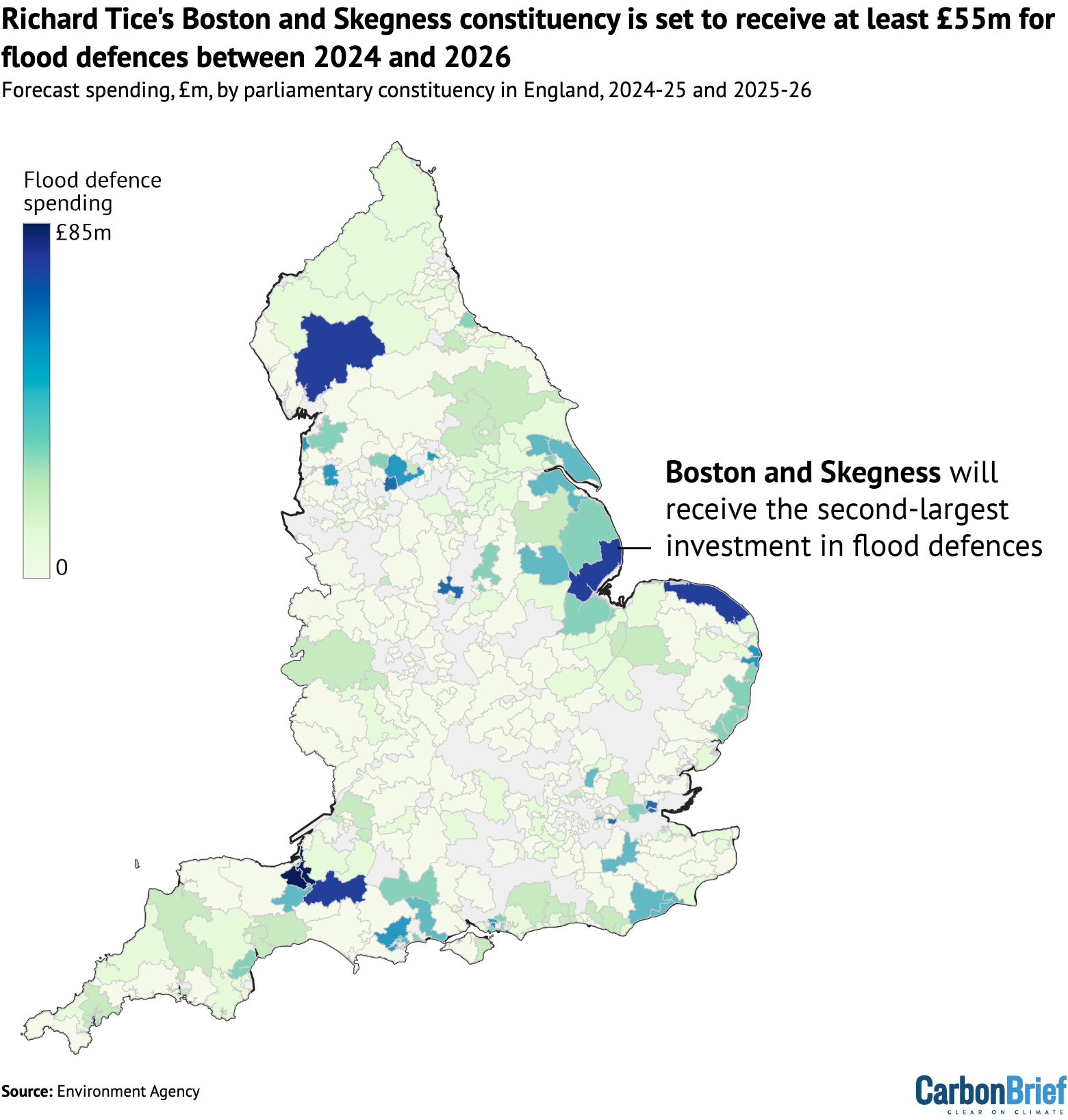
By far the largest sum of money – £85.6m in total – has been committed to a tidal barrier and various other defences in the Somerset constituency of Bridgwater, the seat of Conservative MP Ashley Fox.
Over the first months of 2026, the south-west region has faced significant flooding and Fox has called for more support from the government, citing “climate patterns shifting and rainfall intensifying”.
He has also backed his party’s position that “the 2050 net-zero target is impossible” and called for more fossil-fuel extraction in the North Sea.
Tice’s east-coast constituency of Boston and Skegness, which is highly vulnerable to flooding from both rivers and the sea, is set to receive £55m. Among the supported projects are beach defences from Saltfleet to Gibraltar Point and upgrades to pumping stations.
Overall, Boston and Skegness has the second-largest portion of flood-defence funding, as the chart below shows. Constituencies with Conservative and Liberal Democrat MPs occupied the other top positions.
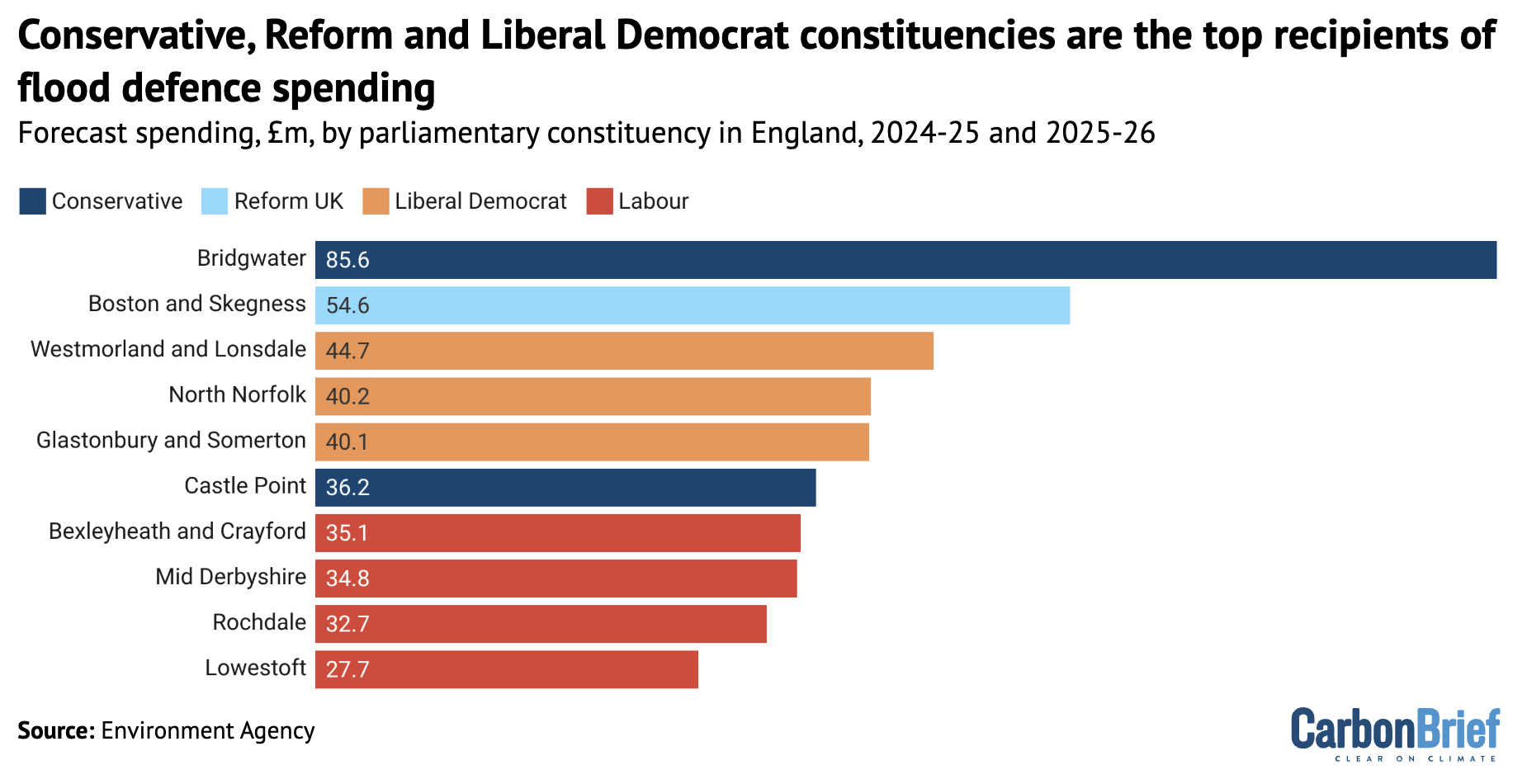
Overall, despite Labour MPs occupying 347 out of England’s 543 constituencies – nearly two-thirds of the total – more than half of the flood-defence funding was distributed to constituencies with non-Labour MPs. This reflects the flood risk in coastal and rural areas that are not traditional Labour strongholds.
Reform funding
While Reform has just eight MPs, representing 1% of the population, its constituencies have been assigned 4% of the flood-defence funding for England.
Nearly all of this money was for Tice’s constituency, although party leader Nigel Farage’s coastal Clacton seat in Kent received £2m.
Reform UK is committed to “scrapping net-zero” and its leadership has expressed firmly climate-sceptic views.
Much has been made of the disconnect between the party’s climate policies and the threat climate change poses to its voters. Various analyses have shown the flood risk in Reform-dominated areas, particularly Lincolnshire.
Tice has rejected climate science, advocated for fossil-fuel production and criticised Environment Agency flood-defence activities. Yet, he has also called for more investment in flood defences, stating that “we cannot afford to ‘surrender the fens’ to the sea”.
This may reflect Tice’s broader approach to climate change. In a 2024 interview with LBC, he said:
“Where you’ve got concerns about sea level defences and sea level rise, guess what? A bit of steel, a bit of cement, some aggregate…and you build some concrete sea level defences. That’s how you deal with rising sea levels.”
While climate adaptation is viewed as vital in a warming world, there are limits on how much societies can adapt and adaptation costs will continue to increase as emissions rise.
The post Analysis: Constituency of Reform’s climate-sceptic Richard Tice gets £55m flood funding appeared first on Carbon Brief.
Analysis: Constituency of Reform’s climate-sceptic Richard Tice gets £55m flood funding
Greenhouse Gases
Cropped 25 February 2026: Food inflation strikes | El Niño looms | Biodiversity talks stagnate
We handpick and explain the most important stories at the intersection of climate, land, food and nature over the past fortnight.
This is an online version of Carbon Brief’s fortnightly Cropped email newsletter.
Subscribe for free here.
Key developments
Food inflation on the rise
DELUGE STRIKES FOOD: Extreme rainfall and flooding across the Mediterranean and north Africa has “battered the winter growing regions that feed Europe…threatening food price rises”, reported the Financial Times. Western France has “endured more than 36 days of continuous rain”, while farmers’ associations in Spain’s Andalusia estimate that “20% of all production has been lost”, it added. Policy expert David Barmes told the paper that the “latest storms were part of a wider pattern of climate shocks feeding into food price inflation”.
-
Sign up to Carbon Brief’s free “Cropped” email newsletter. A fortnightly digest of food, land and nature news and views. Sent to your inbox every other Wednesday.
NO BEEF: The UK’s beef farmers, meanwhile, “face a double blow” from climate change as “relentless rain forces them to keep cows indoors”, while last summer’s drought hit hay supplies, said another Financial Times article. At the same time, indoor growers in south England described a 60% increase in electricity standing charges as a “ticking timebomb” that could “force them to raise their prices or stop production, which will further fuel food price inflation”, wrote the Guardian.
‘TINDERBOX’ AND TARIFFS: A study, covered by the Guardian, warned that major extreme weather and other “shocks” could “spark social unrest and even food riots in the UK”. Experts cited “chronic” vulnerabilities, including climate change, low incomes, poor farming policy and “fragile” supply chains that have made the UK’s food system a “tinderbox”. A New York Times explainer noted that while trade could once guard against food supply shocks, barriers such as tariffs and export controls – which are being “increasingly” used by politicians – “can shut off that safety valve”.
El Niño looms
NEW ENSO INDEX: Researchers have developed a new index for calculating El Niño, the large-scale climate pattern that influences global weather and causes “billions in damages by bringing floods to some regions and drought to others”, reported CNN. It added that climate change is making it more difficult for scientists to observe El Niño patterns by warming up the entire ocean. The outlet said that with the new metric, “scientists can now see it earlier and our long-range weather forecasts will be improved for it.”
WARMING WARNING: Meanwhile, the US Climate Prediction Center announced that there is a 60% chance of the current La Niña conditions shifting towards a neutral state over the next few months, with an El Niño likely to follow in late spring, according to Reuters. The Vibes, a Malaysian news outlet, quoted a climate scientist saying: “If the El Niño does materialise, it could possibly push 2026 or 2027 as the warmest year on record, replacing 2024.”
CROP IMPACTS: Reuters noted that neutral conditions lead to “more stable weather and potentially better crop yields”. However, the newswire added, an El Niño state would mean “worsening drought conditions and issues for the next growing season” to Australia. El Niño also “typically brings a poor south-west monsoon to India, including droughts”, reported the Hindu’s Business Line. A 2024 guest post for Carbon Brief explained that El Niño is linked to crop failure in south-eastern Africa and south-east Asia.
News and views
- DAM-AG-ES: Several South Korean farmers filed a lawsuit against the country’s state-owned utility company, “seek[ing] financial compensation for climate-related agricultural damages”, reported United Press International. Meanwhile, a national climate change assessment for the Philippines found that the country “lost up to $219bn in agricultural damages from typhoons, floods and droughts” over 2000-10, according to Eco-Business.
- SCORCHED GRASS: South Africa’s Western Cape province is experiencing “one of the worst droughts in living memory”, which is “scorching grass and killing livestock”, said Reuters. The newswire wrote: “In 2015, a drought almost dried up the taps in the city; farmers say this one has been even more brutal than a decade ago.”
- NOUVELLE VEG: New guidelines published under France’s national food, nutrition and climate strategy “urged” citizens to “limit” their meat consumption, reported Euronews. The delayed strategy comes a month after the US government “upended decades of recommendations by touting consumption of red meat and full-fat dairy”, it noted.
- COURTING DISASTER: India’s top green court accepted the findings of a committee that “found no flaws” in greenlighting the Great Nicobar project that “will lead to the felling of a million trees” and translocating corals, reported Mongabay. The court found “no good ground to interfere”, despite “threats to a globally unique biodiversity hotspot” and Indigenous tribes at risk of displacement by the project, wrote Frontline.
- FISH FALLING: A new study found that fish biomass is “falling by 7.2% from as little as 0.1C of warming per decade”, noted the Guardian. While experts also pointed to the role of overfishing in marine life loss, marine ecologist and study lead author Dr Shahar Chaikin told the outlet: “Our research proves exactly what that biological cost [of warming] looks like underwater.”
- TOO HOT FOR COFFEE: According to new analysis by Climate Central, countries where coffee beans are grown “are becoming too hot to cultivate them”, reported the Guardian. The world’s top five coffee-growing countries faced “57 additional days of coffee-harming heat” annually because of climate change, it added.
Spotlight
Nature talks inch forward
This week, Carbon Brief covers the latest round of negotiations under the UN Convention on Biological Diversity (CBD), which occurred in Rome over 16-19 February.
The penultimate set of biodiversity negotiations before October’s Conference of the Parties ended in Rome last week, leaving plenty of unfinished business.
The CBD’s subsidiary body on implementation (SBI) met in the Italian capital for four days to discuss a range of issues, including biodiversity finance and reviewing progress towards the nature targets agreed under the Kunming-Montreal Global Biodiversity Framework (GBF).
However, many of the major sticking points – particularly around finance – will have to wait until later this summer, leaving some observers worried about the capacity for delegates to get through a packed agenda at COP17.
The SBI, along with the subsidiary body on scientific, technical and technological advice (SBSTTA) will both meet in Nairobi, Kenya, later this summer for a final round of talks before COP17 kicks off in Yerevan, Armenia, on 19 October.
Money talks
Finance for nature has long been a sticking point at negotiations under the CBD.
Discussions on a new fund for biodiversity derailed biodiversity talks in Cali, Colombia, in autumn 2024, requiring resumed talks a few months later.
Despite this, finance was barely on the agenda at the SBI meetings in Rome. Delegates discussed three studies on the relationship between debt sustainability and implementation of nature plans, but the more substantive talks are set to take place at the next SBI meeting in Nairobi.
Several parties “highlighted concerns with the imbalance of work” on finance between these SBI talks and the next ones, reported Earth Negotiations Bulletin (ENB).
Lim Li Ching, senior researcher at Third World Network, noted that tensions around finance permeated every aspect of the talks. She told Carbon Brief:
“If you’re talking about the gender plan of action – if there’s little or no financial resources provided to actually put it into practice and implement it, then it’s [just] paper, right? Same with the reporting requirements and obligations.”
Monitoring and reporting
Closely linked to the issue of finance is the obligations of parties to report on their progress towards the goals and targets of the GBF.
Parties do so through the submission of national reports.
Several parties at the talks pointed to a lack of timely funding for driving delays in their reporting, according to ENB.
A note released by the CBD Secretariat in December said that no parties had submitted their national reports yet; by the time of the SBI meetings, only the EU had. It further noted that just 58 parties had submitted their national biodiversity plans, which were initially meant to be published by COP16, in October 2024.
Linda Krueger, director of biodiversity and infrastructure policy at the environmental not-for-profit Nature Conservancy, told Carbon Brief that despite the sparse submissions, parties are “very focused on the national report preparation”. She added:
“Everybody wants to be able to show that we’re on the path and that there still is a pathway to getting to 2030 that’s positive and largely in the right direction.”
Watch, read, listen
NET LOSS: Nigeria’s marine life is being “threatened” by “ghost gear” – nets and other fishing equipment discarded in the ocean – said Dialogue Earth.
COMEBACK CAUSALITY: A Vox long-read looked at whether Costa Rica’s “payments for ecosystem services” programme helped the country turn a corner on deforestation.
HOMEGROWN GOALS: A Straits Times podcast discussed whether import-dependent Singapore can afford to shelve its goal to produce 30% of its food locally by 2030.
‘RUSTING’ RIVERS: The Financial Times took a closer look at a “strange new force blighting the [Arctic] landscape”: rivers turning rust-orange due to global warming.
New science
- Lakes in the Congo Basin’s peatlands are releasing carbon that is thousands of years old | Nature Geoscience
- Natural non-forest ecosystems – such as grasslands and marshlands – were converted for agriculture at four times the rate of land with tree cover between 2005 and 2020 | Proceedings of the National Academy of Sciences
- Around one-quarter of global tree-cover loss over 2001-22 was driven by cropland expansion, pastures and forest plantations for commodity production | Nature Food
In the diary
- 2-6 March: UN Food and Agriculture Organization regional conference for Latin America and Caribbean | Brasília
- 5 March: Nepal general elections
- 9-20 March: First part of the thirty-first session of the International Seabed Authority (ISA) | Kingston, Jamaica
Cropped is researched and written by Dr Giuliana Viglione, Aruna Chandrasekhar, Daisy Dunne, Orla Dwyer and Yanine Quiroz.
Please send tips and feedback to cropped@carbonbrief.org
The post Cropped 25 February 2026: Food inflation strikes | El Niño looms | Biodiversity talks stagnate appeared first on Carbon Brief.
Cropped 25 February 2026: Food inflation strikes | El Niño looms | Biodiversity talks stagnate
-
Greenhouse Gases7 months ago
Guest post: Why China is still building new coal – and when it might stop
-
Climate Change7 months ago
Guest post: Why China is still building new coal – and when it might stop
-

 Greenhouse Gases2 years ago
Greenhouse Gases2 years ago嘉宾来稿:满足中国增长的用电需求 光伏加储能“比新建煤电更实惠”
-
Climate Change2 years ago
Bill Discounting Climate Change in Florida’s Energy Policy Awaits DeSantis’ Approval
-
Climate Change2 years ago
Spanish-language misinformation on renewable energy spreads online, report shows
-

 Climate Change2 years ago
Climate Change2 years ago嘉宾来稿:满足中国增长的用电需求 光伏加储能“比新建煤电更实惠”
-
Climate Change Videos2 years ago
The toxic gas flares fuelling Nigeria’s climate change – BBC News
-

 Carbon Footprint2 years ago
Carbon Footprint2 years agoUS SEC’s Climate Disclosure Rules Spur Renewed Interest in Carbon Credits





